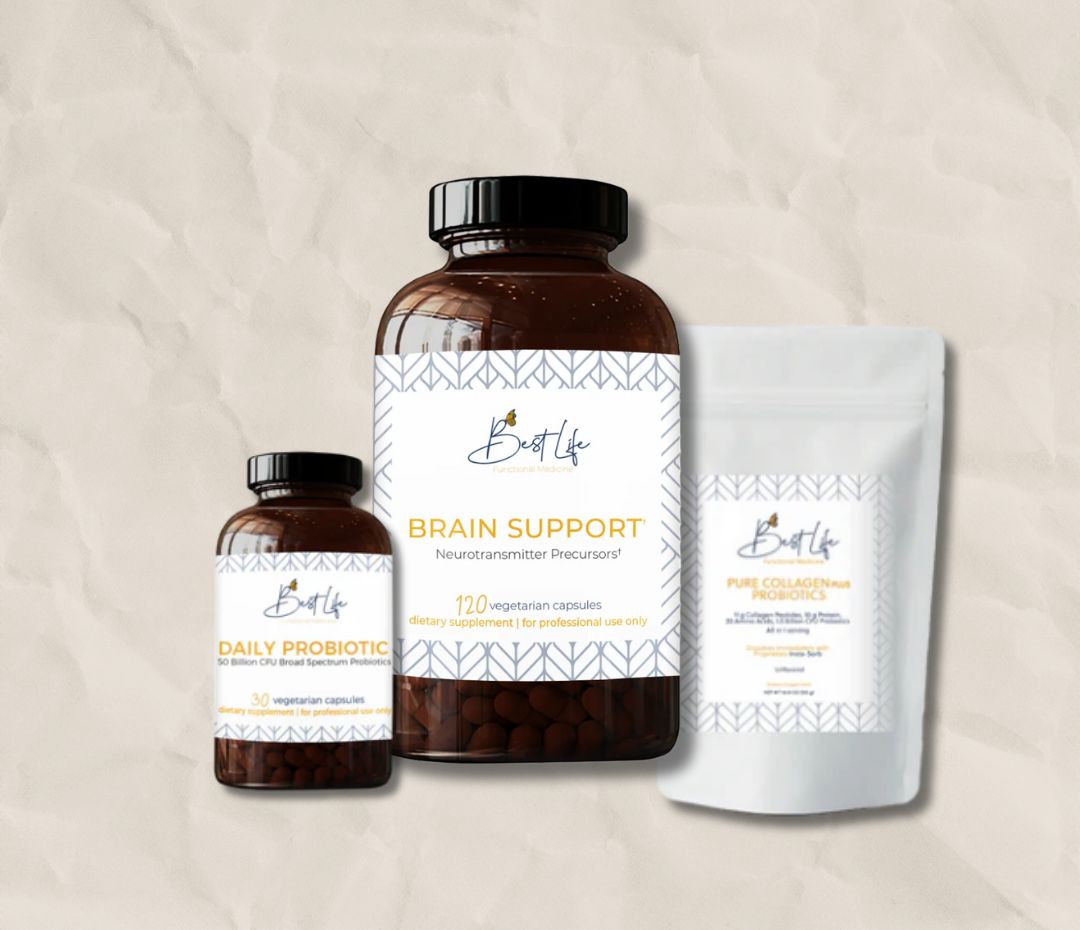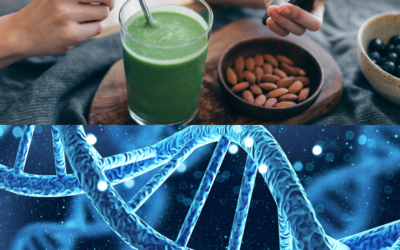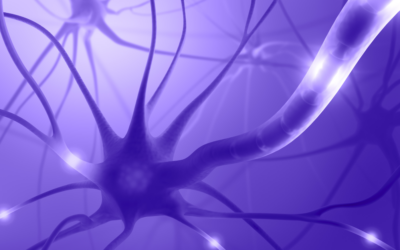While summer often brings longer days, more sunshine, and outdoor activities, it doesn’t automatically guarantee that we feel our best mentally or emotionally. In fact, high-paced schedules, travel disruptions, sleep shifts, and even dietary changes this time of year can leave many of us feeling scattered, anxious, or fatigued.
If you’ve been struggling with mood swings, brain fog, irritability, digestive issues, or poor sleep—even during this sunny season—it may be time to check in on your serotonin levels.
Serotonin is one of the brain’s key “happy hormones,” deeply involved in regulating mood, memory, digestion, and sleep. Lower levels of serotonin are linked to depression, anxiety, OCD, poor digestion, and focus problems, and summer is no exception when it comes to the need for healthy brain chemistry.
What Is Serotonin and Why Does It Matter?
Serotonin is a powerful neurotransmitter that helps regulate:
-
Mood and emotional stability
-
Sleep cycles
-
Digestive function
-
Appetite and metabolism
-
Cardiovascular activity
-
Cognitive performance and memory
While serotonin is produced in the brain, over 90% of it is actually made in your gut, which explains why digestive symptoms often accompany low mood or anxiety. If your gut isn’t functioning optimally, your brain chemistry likely isn’t either.
Could You Have Low Serotonin?
Here are common signs to watch for:
-
Feeling low, anxious, or emotionally overwhelmed
-
Digestive issues like bloating or IBS
-
Brain fog and difficulty concentrating
-
Poor or irregular sleep
-
Cravings, especially for carbs or sugar
-
Obsessive thoughts or compulsive behaviors
5 Natural Ways to Support Serotonin This Summer
1. Focus on Protein + Carbs for Brain Fuel
Serotonin is synthesized from the amino acid tryptophan, which is best absorbed when eaten with carbohydrates. Incorporate meals with turkey, salmon, pumpkin seeds, oats, or quinoa, paired with sweet potatoes or fruit.
2. Support Your Gut Daily
A healthy gut means better serotonin production. Prioritize fermented foods like sauerkraut, kefir, and kombucha, and eat anti-inflammatory whole foods like leafy greens, berries, avocado, and wild-caught fish.
3. Prioritize Movement You Love
Whether it’s a brisk morning walk, a bike ride, or a swim, aerobic exercise boosts serotonin levels and enhances brain plasticity. The key is consistency, not perfection.
4. Get Sun + Sleep in Sync
Sunlight naturally boosts serotonin, but so does quality sleep, which summer fun can sometimes disrupt. Aim for a consistent wind-down routine and expose yourself to morning light for a natural circadian reset.
5. Add in Smart Supplement Support
Sometimes food and lifestyle alone aren’t enough, and that’s where high-quality supplements can make a difference.
Brain Support: Your Summer Ally for Mental Clarity & Mood
If you’re feeling scattered, anxious, or mentally exhausted despite your best efforts, Brain Support is the supplement I most often recommend to clients this time of year.
It’s thoughtfully formulated with:
-
5-HTP, a direct precursor to serotonin
-
Tyrosine, which helps produce dopamine (our motivation and focus hormone)
-
B vitamins and cofactors needed to help your brain actually use those happy hormones
-
Ingredients that support neurotransmitter balance, mental clarity, and stress resilience
Think of Brain Support as your daily nudge toward a sharper, calmer, and more balanced summer.
Other Smart Additions
-
Best Life’s Daily Probiotic: Helps nourish the gut microbiome and naturally supports serotonin synthesis.
-
Pure Collagen by Best Life: Rich in amino acids that support both gut and brain health.
Ready to Feel More Like You Again?
Whether it’s mood dips, digestive issues, or brain fog, serotonin may be the missing link. The good news? We can test, not guess, and create a personalized plan to restore balance—naturally.
If you’re interested in learning more or trying Brain Support this summer, reach out. I’d be honored to help guide you back to optimal health.
Sources
Brenda Mc Mahon, Sofie B. Andersen, Martin K. Madsen, Liv V. Hjordt, Ida Hageman, Henrik Dam, Claus Svarer, Sofi da Cunha-Bang, William Baaré, Jacob Madsen, Lis Hasholt, Klaus Holst, Vibe G. Frokjaer, Gitte M. Knudsen, Seasonal difference in brain serotonin transporter binding predicts symptom severity in patients with seasonal affective disorder, Brain, Volume 139, Issue 5, May 2016, Pages 1605–1614, https://doi.org/10.1093/brain/aww043
Appleton J. The Gut-Brain Axis: Influence of Microbiota on Mood and Mental Health. Integr Med (Encinitas). 2018 Aug;17(4):28-32. PMID: 31043907; PMCID: PMC6469458.
Lin SH, Lee LT, Yang YK. Serotonin and mental disorders: a concise review on molecular neuroimaging evidence. Clin Psychopharmacol Neurosci. 2014 Dec;12(3):196-202. doi: 10.9758/cpn.2014.12.3.196. Epub 2014 Dec 26. PMID: 25598822; PMCID: PMC4293164.
Kikuchi AM, Tanabe A, Iwahori Y. A systematic review of the effect of L-tryptophan supplementation on mood and emotional functioning. J Diet Suppl. 2021;18(3):316-333. doi: 10.1080/19390211.2020.1746725. Epub 2020 Apr 10. PMID: 32272859.
Roth W, Zadeh K, Vekariya R, Ge Y, Mohamadzadeh M. Tryptophan Metabolism and Gut-Brain Homeostasis. Int J Mol Sci. 2021 Mar 15;22(6):2973. doi: 10.3390/ijms22062973. PMID: 33804088; PMCID: PMC8000752.
Baker DE. Rationale for using serotonergic agents to treat irritable bowel syndrome. Am J Health Syst Pharm. 2005 Apr 1;62(7):700-11; quiz 712-3. doi: 10.1093/ajhp/62.7.700. PMID: 15790796.
Young SN. How to increase serotonin in the human brain without drugs. J Psychiatry Neurosci. 2007 Nov;32(6):394-9. PMID: 18043762; PMCID: PMC2077351.
Sansone RA, Sansone LA. Sunshine, serotonin, and skin: a partial explanation for seasonal patterns in psychopathology? Innov Clin Neurosci. 2013 Jul;10(7-8):20-4. PMID: 24062970; PMCID: PMC3779905.
Park BJ, Shin CS, Shin WS, Chung CY, Lee SH, Kim DJ, Kim YH, Park CE. Effects of Forest Therapy on Health Promotion among Middle-Aged Women: Focusing on Physiological Indicators. Int J Environ Res Public Health. 2020 Jun 17;17(12):4348. doi: 10.3390/ijerph17124348. PMID: 32560522; PMCID: PMC7344639.
Kikuchi AM, Tanabe A, Iwahori Y. A systematic review of the effect of L-tryptophan supplementation on mood and emotional functioning. J Diet Suppl. 2021;18(3):316-333. doi: 10.1080/19390211.2020.1746725. Epub 2020 Apr 10. PMID: 32272859.
Maffei ME. 5-Hydroxytryptophan (5-HTP): Natural Occurrence, Analysis, Biosynthesis, Biotechnology, Physiology and Toxicology. Int J Mol Sci. 2020 Dec 26;22(1):181. doi: 10.3390/ijms22010181. PMID: 33375373; PMCID: PMC7796270.





